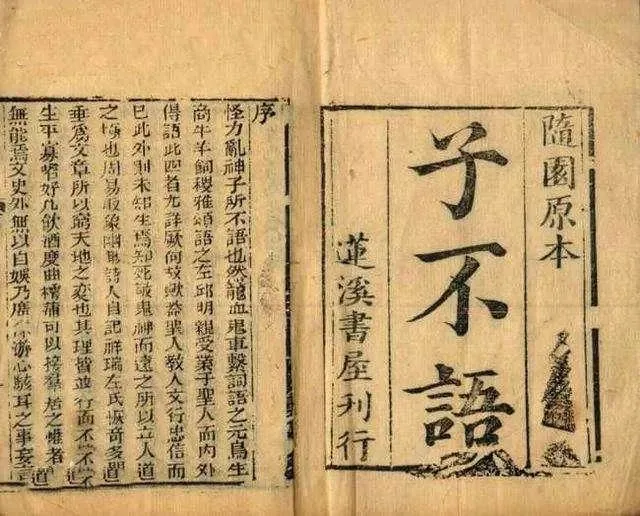
In the annals of literary history, nestled wi?thin the rich tapestry of ancient Chinese folklore and wisdom, lies a clandestine treasure trove: “What the Master Would Not Discuss,” known as Zibuyu. This enigmatic compilation, curated by the Qing Dynasty luminary Yuan Mei, unfurls a mosaic of over 700 supernatural tales, offering a riveting panorama of the forbidden and the uncanny.
Unraveling the Title Zibuyu: Originating from the Analects
The very title, “Zi bu yu,” finds its roots in the profound silence of Confucius as documented in the Analects. Confucius, the revered sage, refrained from delving into certain themes, notably prodigies, force, disorder, and gods. Yuan Mei’s audacious invocation of this silence within the context of his collection sparked both controversy and intrigue, earning it the label “Censored by Confucius.”
Interestingly, Yuan initially christened his work “Xin Qixie,” acknowledging a prior Yuan dynasty text bearing a similar title. However, the allure and resonance of “Zi bu yu” persisted, casting an enduring shadow over this forbidden anthology.
The Chronicle of Wonder: Beyond Mere Stories
With its genesis in 1788, “Zi Buyi” defied the stringent confines of Confucian doctrine, painting a vivid tableau of everyday life steeped in taboo themes. The 747 captivating stories wove a narrative tapestry interlaced with ghosts, intrigue, betrayal, and societal vices, challenging the prevailing norms of the time.
Yuan Mei’s defense of the collection as the musings of an aging man relishing his final days thinly veils his personal dissent against the establishment, subtly intertwined within the tales.
Censored by Confucius: Suppression and Popularity
The allure of “Zi Buyu” proved too potent, capturing the public imagination and inciting governmental unease. Its popularity soared, yet in 1836, the authorities, threatened by its anti-establishment undertones, sought to censor its influence.
Beyond the Bounds: Stories That Transcend Time
The genesis of these 1,000 stories spanned diverse origins—oral traditions, official records, and personal anecdotes—enriching the anthology with a kaleidoscope of narratives resonating with the ethos of an era.
Read English Translations of Stories from Zibuyu
These are the stories from the book “What the Master Would not Discuss”, translated by me. You can also read more from here.

Bear Writing
In the twenty-sixth year of the Qianlong era, there was a beggar in Huqiu who raised a large bear, the…







Nine-Tailed Snake
There was a man named Mao Ba(茅八) who, in his youth, went to Jiangxi to trade paper. In the deep…







Smoke Dragon
Zhang Ningren(張寧人) said that the elderly man next door likes to smoke. He holds a bamboo pipe that is more…







The Immortal Child Brings Rain
A severe drought occurred in Guangdong, and Governor-General Sun Gong(孫公) prayed to the gods for rain, but it was ineffective….







The Ghost’s Purchase
Xu, the household registration secretary of Shanyin County, fell ill and in a daze saw his deceased brother come to…







Maidservant Enters a Hole
Zhang, a gentleman from Hangzhou, said: When my father, Mr. Xingzi(星子先生), served as the educational commissioner in Jiangxi, there was…
FAQ
Who is the author of Zibuyu, and when was it written?
Zibuyu, also known as “What the Master Would Not Discuss,” was compiled by Yuan Mei, a prominent scholar and writer during the Qing Dynasty. It first appeared in print in 1788, heralding a departure from traditional Confucian discourse.
What is the essence of Zibuyu?
At its core, Zibuyu is a collection of over 700 supernatural stories and accounts. This anthology transcends conventional norms, exploring taboo themes such as ghosts, betrayal, sex, revenge, and corruption, reflecting a rich tapestry of daily life during its era.
What genre does Zibuyu belong to?
Zibuyu traverses several genres, encompassing elements of Biji (Chinese essays), Gods and demons fiction, supernatural narratives, fantasy, and adventure. Its diverse storytelling weaves together a tapestry that intrigues and captivates readers.
How does Zibuyu relate to Confucian texts like the Analects?
The title “Zi bu yu” finds its roots in a passage from the Analects of Confucius, highlighting the subjects that Confucius chose not to speak of, including prodigies, force, disorder, and gods. Yuan Mei’s utilization of this silence within the anthology sparked both controversy and fascination, leading to its alternative titles, including “Censored by Confucius.”
What sources contributed to the creation of Zibuyu’s stories?
The stories within Zibuyu were sourced from a myriad of origins—oral accounts shared by friends and relatives, official gazettes, and other existing collections. This diverse array of sources imbues the anthology with a kaleidoscope of narratives, offering a glimpse into the multifaceted society of its time.
“What the Master Would Not Discuss” remains an unparalleled testament to defiance and the enduring allure of the forbidden. From its inception rooted in Confucian silence to its subversion of societal norms, this anthology persists as a testament to the unyielding human spirit, exploring realms that eluded even the wisdom of the ages. Dive into this trove of ancient wisdom and taboo tales, and uncover the echoes of a bygone era, resonating with relevance even in the modern age.
Resources
https://en.wikipedia.org/wiki/What_the_Master_Would_Not_Discuss
